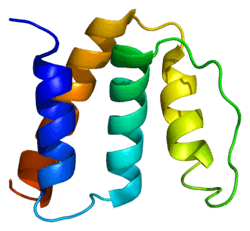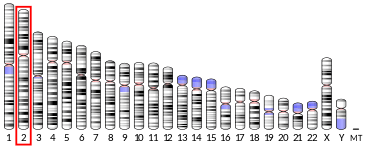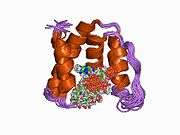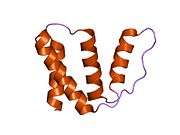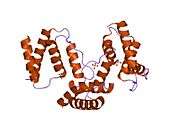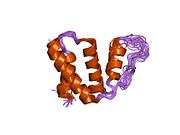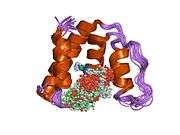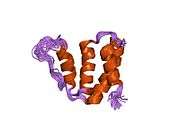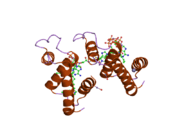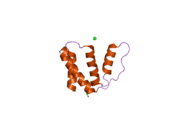Diazepam binding inhibitor
Acyl-CoA-binding protein in humans belongs to the family of Acyl-CoA-binding proteins.[5][6]
This gene encodes diazepam binding inhibitor, a protein that is regulated by hormones and is involved in lipid metabolism and the displacement of beta-carbolines and benzodiazepines, which modulate signal transduction at type A gamma-aminobutyric acid receptors located in brain synapses. The protein is conserved from yeast to mammals, with the most highly conserved domain consisting of seven contiguous residues that constitute the hydrophobic binding site for medium- and long-chain acyl-Coenzyme A esters. Diazepam binding inhibitor also mediates the feedback regulation of pancreatic secretion and the postprandial release of cholecystokinin, in addition to its role as a mediator in corticotropin-dependent synthesis of steroids in the adrenal gland. Three pseudogenes located on chromosomes 6, 8 and 16 have been identified. Multiple transcript variants encoding different isoforms have also been described for this gene.[6]
See also
References
- GRCh38: Ensembl release 89: ENSG00000155368 - Ensembl, May 2017
- GRCm38: Ensembl release 89: ENSMUSG00000026385 - Ensembl, May 2017
- "Human PubMed Reference:". National Center for Biotechnology Information, U.S. National Library of Medicine.
- "Mouse PubMed Reference:". National Center for Biotechnology Information, U.S. National Library of Medicine.
- Todd S, Naylor SL (Dec 1992). "New chromosomal mapping assignments for argininosuccinate synthetase pseudogene 1, interferon-beta 3 gene, and the diazepam binding inhibitor gene". Somat Cell Mol Genet. 18 (4): 381–385. doi:10.1007/BF01235761. PMID 1440058.
- "Entrez Gene: DBI diazepam binding inhibitor (GABA receptor modulator, acyl-Coenzyme A binding protein)".
Further reading
- Papadopoulos V, Brown AS (1995). "Role of the peripheral-type benzodiazepine receptor and the polypeptide diazepam binding inhibitor in steroidogenesis". J. Steroid Biochem. Mol. Biol. 53 (1–6): 103–110. doi:10.1016/0960-0760(95)00027-W. PMID 7626442.
- Costa E, Auta J, Guidotti A, et al. (1994). "The pharmacology of neurosteroidogenesis". J. Steroid Biochem. Mol. Biol. 49 (4–6): 385–389. doi:10.1016/0960-0760(94)90284-4. PMID 8043504.
- Mandrup S, Hummel R, Ravn S, et al. (1993). "Acyl-CoA-binding protein/diazepam-binding inhibitor gene and pseudogenes. A typical housekeeping gene family". J. Mol. Biol. 228 (3): 1011–1022. doi:10.1016/0022-2836(92)90888-Q. PMID 1469708.
- Webb NR, Rose TM, Malik N, et al. (1987). "Bovine and human cDNA sequences encoding a putative benzodiazepine receptor ligand". DNA. 6 (1): 71–79. doi:10.1089/dna.1987.6.71. PMID 2881742.
- Gray PW, Glaister D, Seeburg PH, et al. (1986). "Cloning and expression of cDNA for human diazepam binding inhibitor, a natural ligand of an allosteric regulatory site of the gamma-aminobutyric acid type A receptor". Proc. Natl. Acad. Sci. U.S.A. 83 (19): 7547–7551. doi:10.1073/pnas.83.19.7547. PMC 386756. PMID 3020548.
- DeBernardi MA, Crowe RR, Mocchetti I, et al. (1988). "Chromosomal localization of the human diazepam binding inhibitor gene". Proc. Natl. Acad. Sci. U.S.A. 85 (17): 6561–6565. doi:10.1073/pnas.85.17.6561. PMC 282013. PMID 3413112.
- Marquardt H, Todaro GJ, Shoyab M (1986). "Complete amino acid sequences of bovine and human endozepines. Homology with rat diazepam binding inhibitor". J. Biol. Chem. 261 (21): 9727–9731. PMID 3525533.
- Swinnen JV, Esquenet M, Heyns W, et al. (1995). "Androgen regulation of the messenger RNA encoding diazepam-binding inhibitor/acyl-CoA-binding protein in the human prostatic adenocarcinoma cell line LNCaP". Mol. Cell. Endocrinol. 104 (2): 153–162. doi:10.1016/0303-7207(94)90118-X. PMID 7527352.
- Kolmer M, Rovio A, Alho H (1995). "The characterization of two diazepam binding inhibitor (DBI) transcripts in humans". Biochem. J. 306 (Pt 2): 327–330. PMC 1136524. PMID 7534063.
- Gersuk VH, Rose TM, Todaro GJ (1995). "Molecular cloning and chromosomal localization of a pseudogene related to the human acyl-CoA binding protein/diazepam binding inhibitor". Genomics. 25 (2): 469–476. doi:10.1016/0888-7543(95)80047-P. PMID 7789980.
- Alho H, Kolmer M, Harjuntausta T, Helén P (1995). "Increased expression of diazepam binding inhibitor in human brain tumors". Cell Growth Differ. 6 (3): 309–314. PMID 7794798.
- Alho H, Vaalasti A, Podkletnova I, Rechardt L (1994). "Expression of diazepam-binding inhibitor peptide in human skin: an immunohistochemical and ultrastructural study". J. Invest. Dermatol. 101 (6): 800–803. doi:10.1111/1523-1747.ep12371698. PMID 8245508.
- Cavallaro S, Pani L, Guidotti A, Costa E (1993). "ACTH-induced mitochondrial DBI receptor (MDR) and diazepam binding inhibitor (DBI) expression in adrenals of hypophysectomized rats is not cause-effect related to its immediate steroidogenic action". Life Sci. 53 (14): 1137–1147. doi:10.1016/0024-3205(93)90550-M. PMID 8396705.
- Swinnen JV, Esquenet M, Rosseels J, et al. (1996). "A human gene encoding diazepam-binding inhibitor/acy1-CoA-binding protein: transcription and hormonal regulation in the androgen-sensitive human prostatic adenocarcinoma cell line LNCaP". DNA Cell Biol. 15 (3): 197–208. doi:10.1089/dna.1996.15.197. PMID 8634149.
- Krøll JB, Nøhr J, Gregersen N, et al. (1996). "Structure of the rat gene encoding the multifunctional acyl-CoA-binding protein: conservation of intron 1 sequences in rodents and man. Addendum". Gene. 173 (2): 239–240. doi:10.1016/0378-1119(96)00214-4. PMID 8964506.
- Kolmer M, Pelto-Huikko M, Parvinen M, et al. (1997). "The transcriptional and translational control of diazepam binding inhibitor expression in rat male germ-line cells". DNA Cell Biol. 16 (1): 59–72. doi:10.1089/dna.1997.16.59. PMID 9022045.
- Ferrarese C, Cogliati T, Tortorella R, et al. (1998). "Diazepam binding inhibitor (DBI) in the plasma of pediatric and adult epileptic patients". Epilepsy Res. 29 (2): 129–134. doi:10.1016/S0920-1211(97)00074-0. PMID 9477145.
